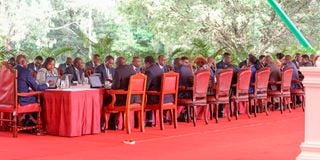Premium
President Ruto puts CSs under the microscope in late-night meetings

President William Ruto chairs a Cabinet meeting at State House in Nairobi on January 15.
An inquisitive President William Ruto has been demanding clear and concise answers from his Cabinet secretaries on complete and planned projects within their ministries, challenging them on their performance in the ongoing National Executive Retreat in Naivasha, Nakuru County.
The CSs have found themselves on the receiving end amid pressure from Kenya Kwanza lawmakers barely a day into the three-day retreat in which meetings had been going past 9pm.
A December survey by Tifa Research showed that Kenya Kwanza supporters are the most disillusioned with the state of affairs in the country, with supporters of the President disappointed with his administration’s performance since it came to power in September 2022.
The President is on record reprimanding his ministers and their principal secretaries, saying some did not know their roles.
The ongoing Naivasha meeting comes at a time when the President is under pressure to deliver on his campaign pledges. ‘Nation’ has established that the CSs, PSs and advisers were told on Monday that they have no choice but to be accountable to Kenyans.
The daily meetings have been starting at 7.30am and ending well past 9pm, with CSs answering questions on their performance in the implementation of Dr Ruto’s Bottom-Up Economic Transformation Agenda.
The long meetings, Nation understands, were borne out of the realisation that President Ruto is the appointing authority and will be blamed should his government fail to deliver on his lofty development manifesto.
Last October, the President reshuffled his Cabinet, shifting some functions and reconstructing some ministries. Some PSs were also affected by the changes.
On Tuesday, Public Service CS Moses Kuria, whose duty it is to oversee, monitor, and evaluate performance of all government ministries, departments and agencies, explained that the meetings reviewed resolutions made in the first retreat in Nanyuki last year.
Mr Kuria said public debt and its repayment and the high cost of living featured prominently in the discussions, as was the economic recovery of the country.
“We’ve all agreed that 2024 is the year of deliverables. There are some 181 projects in 25 pillars we discussed today in our session. We’ve been asked to work as a team so that we help the President achieve his manifesto,” Mr Kuria said.
Prime Cabinet Secretary Musalia Mudavadi, whose ministry is in charge of prioritisation and coordination of government programmes, presented a report.
“We want to make sure that our desire to deliver services is coordinated, cost-effective and prudent. This is the whole objective. The President has catapulted Kenya on the international arena, a major achievement for our economic diplomacy,” he said.
Yesterday’s sessions with the National Treasury focused on the country’s economic health, with Treasury CS Njuguna Ndung’u and PS Dr Chris Kiptoo making presentations.
They explained why the shilling has strengthened against the dollar over the past few days.
“We noticed that, however, much we tried to talk about the strategy to resolve the Eurobond, there were always some doubts because a big portion, especially our microstructure of the market, believed that the government would still go to the market to buy dollars to pay the Eurobond,” Prof Ndung’u said.
The government plans to collect an additional Sh323.5 billion in taxes, in a budget spending plan that will see the Ruto administration spend a total of Sh4.55 trillion, mostly on salaries and debt repayments.
In the 2024 Budget Policy Statement (BPS), the government targets to collect Sh2.95 trillion in taxes in the fiscal year 2024/25 (July to June), relying on the proposed far-reaching tax measures that target the hard-to-tax sectors such as jua kali, digital and agricultural activities. In the current fiscal year, the Kenya Revenue Authority has been tasked with collecting Sh2.62 trillion from direct and indirect taxes. These collections rely heavily on the revenue-raising measures contained in the Finance Act 2023, including the doubling of the value-added tax (VAT) on fuel.
Last week, the Treasury raised $1.5 billion through a Eurobond issuance with the proceeds expected to be used to buy back part of the 2024 sovereign bond.





